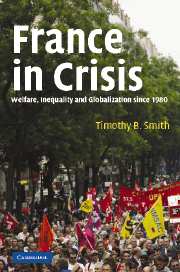Book contents
- Frontmatter
- Contents
- List of tables
- Preface
- 1 The misunderstood French welfare state
- 2 Corporatist welfare states: the residue of the past, or the wave of the future?
- 3 The “treason of the intellectuals”: globalization as the big excuse for France's economic and social problems
- 4 France's break with socialism
- 5 Persisting inequalities
- 6 The protected people
- 7 The excluded: immigrants, youth, women
- 8 The French exception
- Appendix: Some major pieces of social legislation, France 1893–2003
- Notes
- Index
1 - The misunderstood French welfare state
Published online by Cambridge University Press: 12 January 2010
- Frontmatter
- Contents
- List of tables
- Preface
- 1 The misunderstood French welfare state
- 2 Corporatist welfare states: the residue of the past, or the wave of the future?
- 3 The “treason of the intellectuals”: globalization as the big excuse for France's economic and social problems
- 4 France's break with socialism
- 5 Persisting inequalities
- 6 The protected people
- 7 The excluded: immigrants, youth, women
- 8 The French exception
- Appendix: Some major pieces of social legislation, France 1893–2003
- Notes
- Index
Summary
Globalization and the intensified competition in every market in every country are used as all-purpose justifications: for the fall in real wages, the dismantling of social welfare systems, spiralling unemployment, generalized job insecurity, deteriorating working conditions, and so on. We are told these things are inevitable and natural.
Sociologist André Gorz, in Misères du présent, richesse du possible (1997).The American social model threatens Europe … the exportation by the United States of its distinct model of deregulated capitalism constitutes a threat to European nations.
Emmanuel Todd, Après l'Empire: Essai sur la décomposition du système américain (2002), a best-selling book in France in 2002–03.The French social model rests at the heart of the European social model. People from other continents expect that France will maintain the flame of this [great] social model.
Centrist labor leader Nicole Notat, in Jean de Belot, ed., Quelle ambition pour la France? (2002).The supporters of France's current social and economic model argue that the high levels of unemployment and inequality, and declining job security which have characterized the nation since the late 1970s are dangerous imports which should be stopped at the border with a social democratic Maginot Line. This book argues that these problems are made in France, the product of good intentions, bad policies, and vested interests.
Among rich Western European and North American nations, France has the poorest record of job creation and the most dramatic increase in unemployment during the last quarter of the twentieth century – but the most impressive social-spending record, the most impressive record of labor-law innovations, and the second highest level of pension increases.
- Type
- Chapter
- Information
- France in CrisisWelfare, Inequality, and Globalization since 1980, pp. 1 - 18Publisher: Cambridge University PressPrint publication year: 2004

